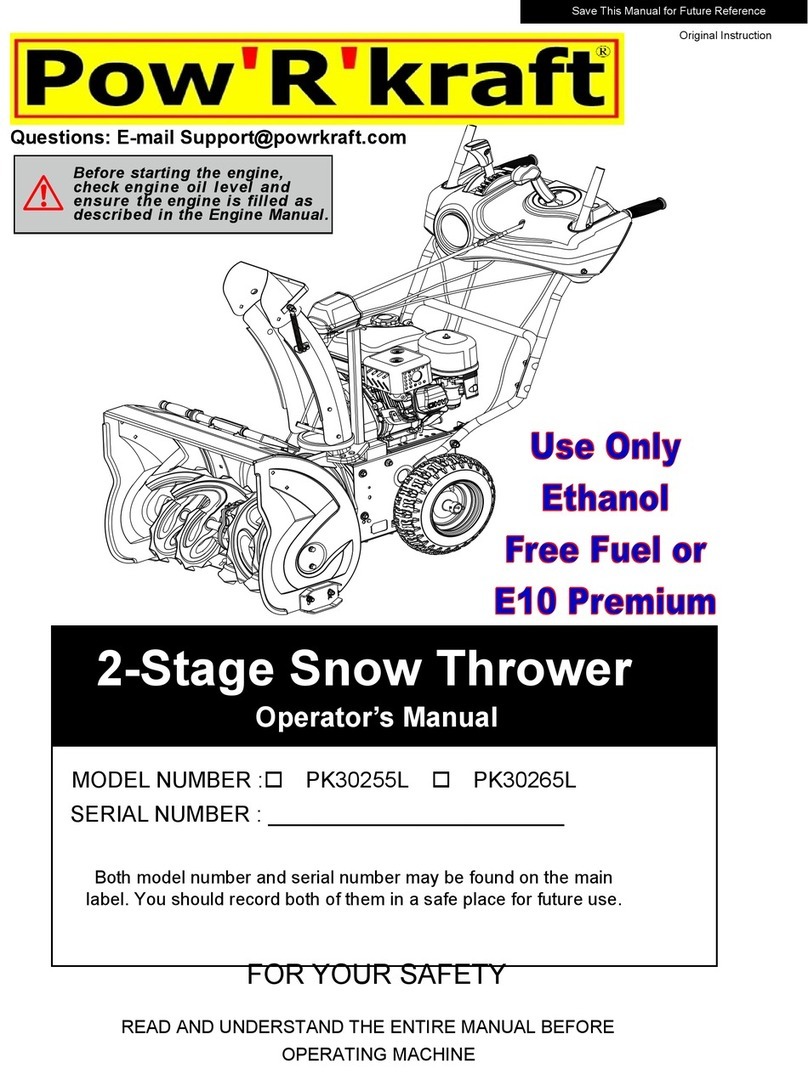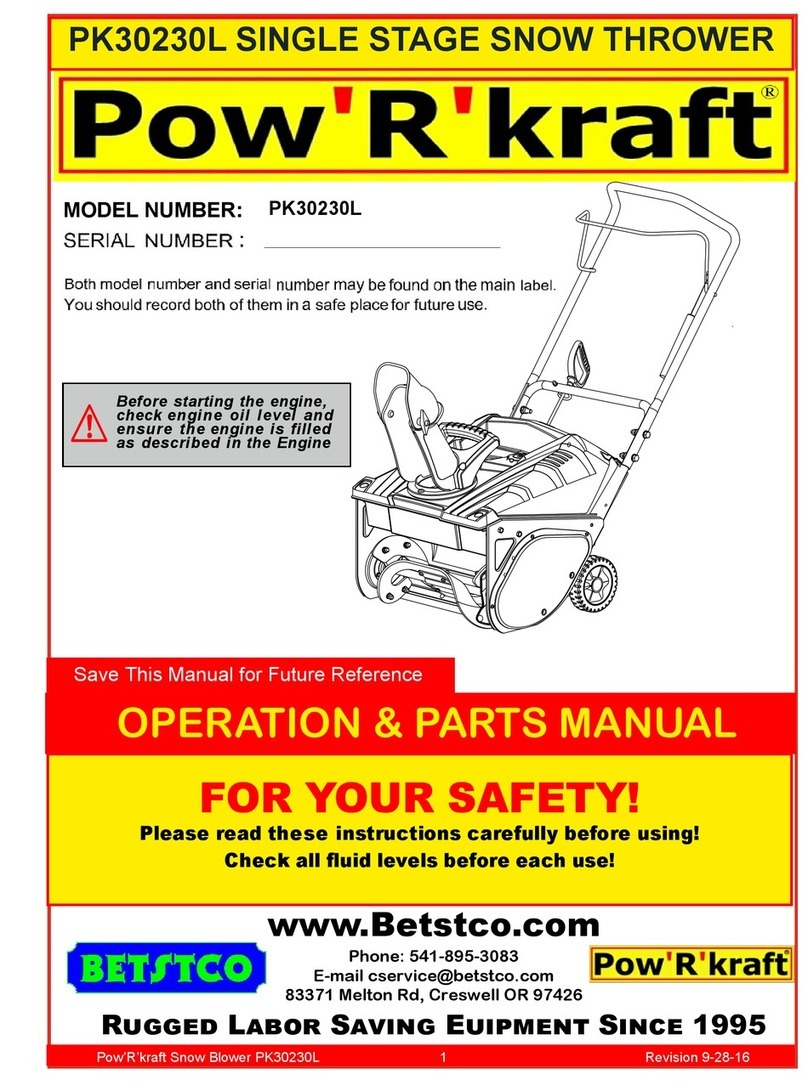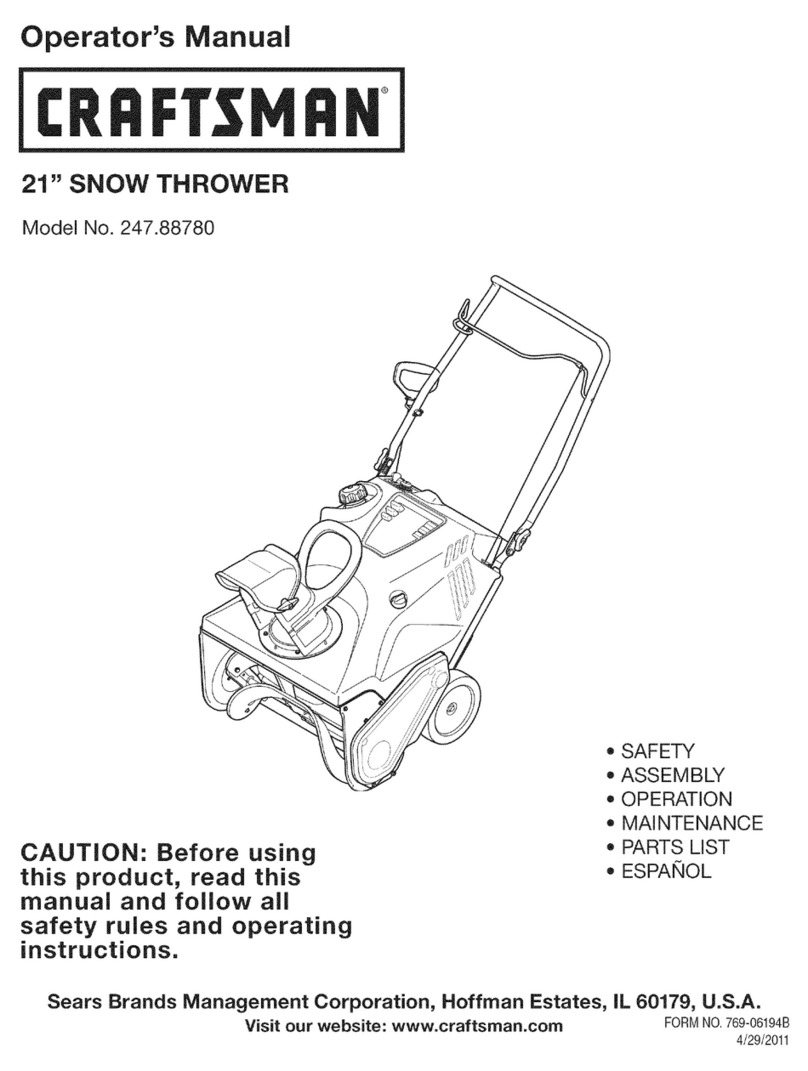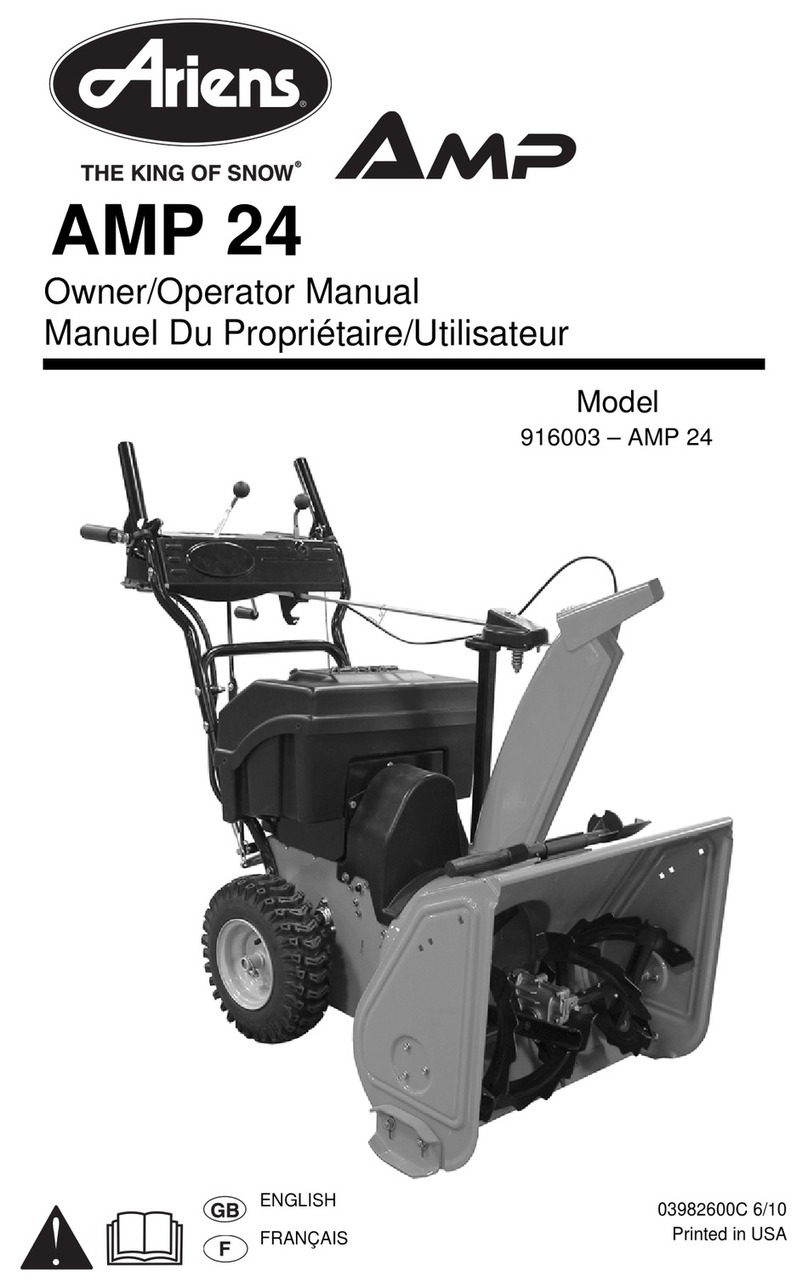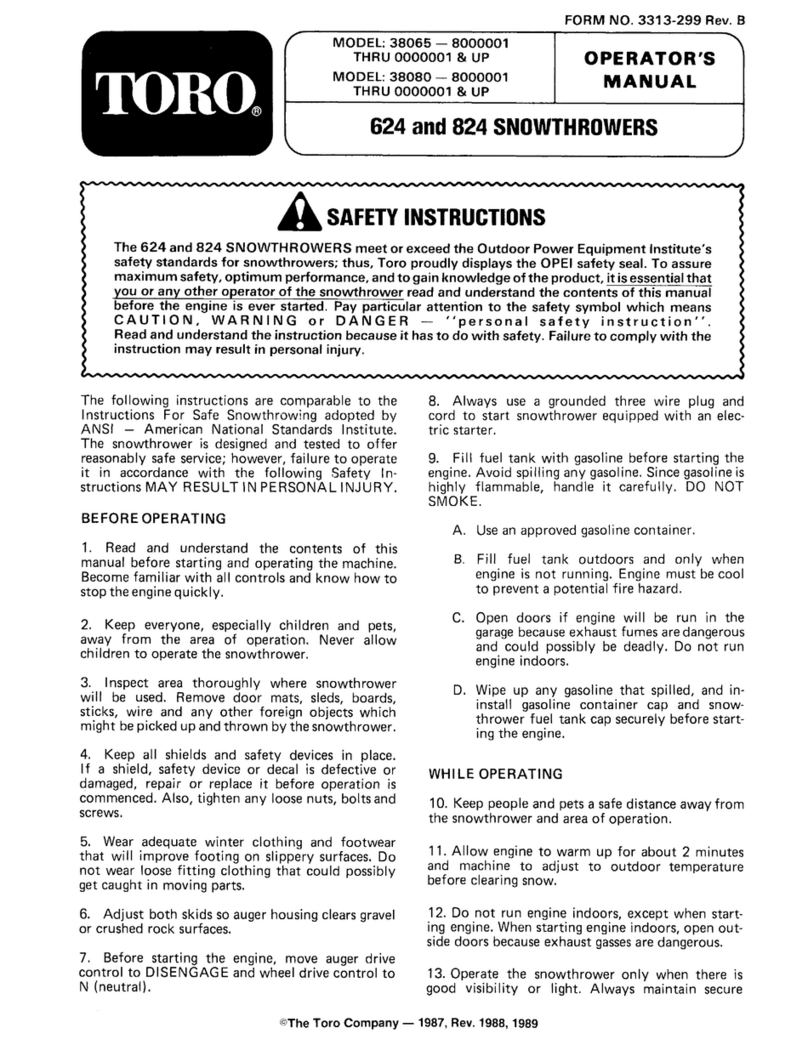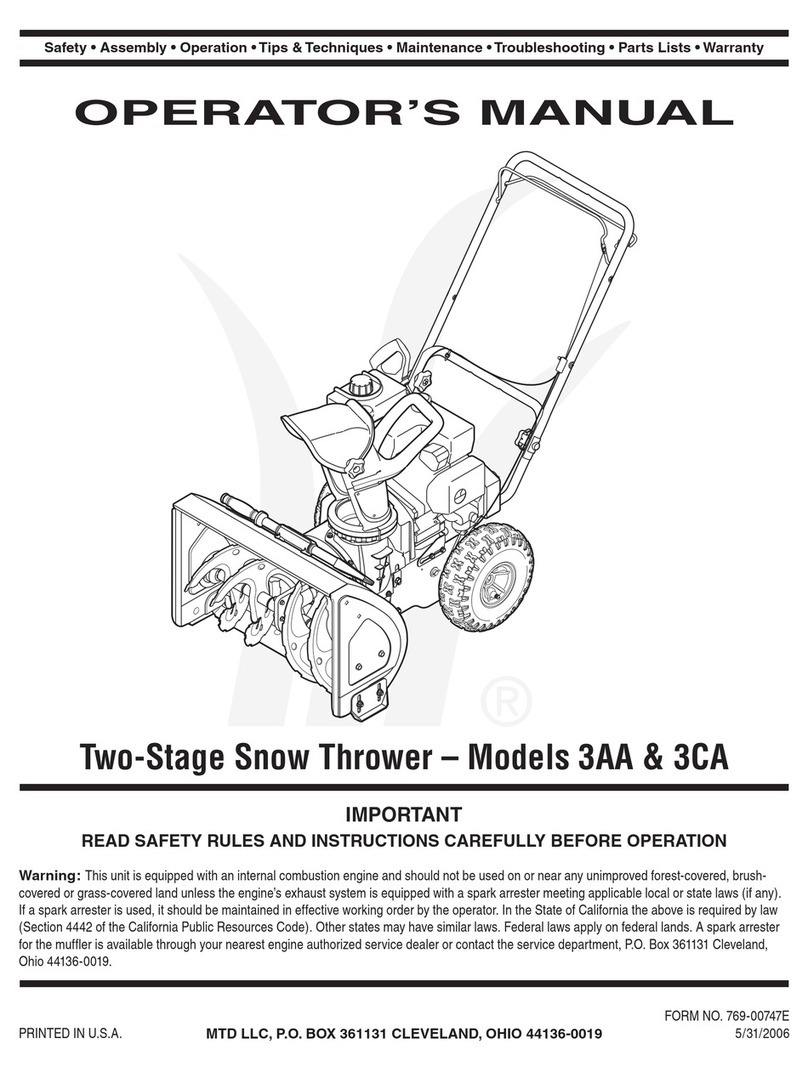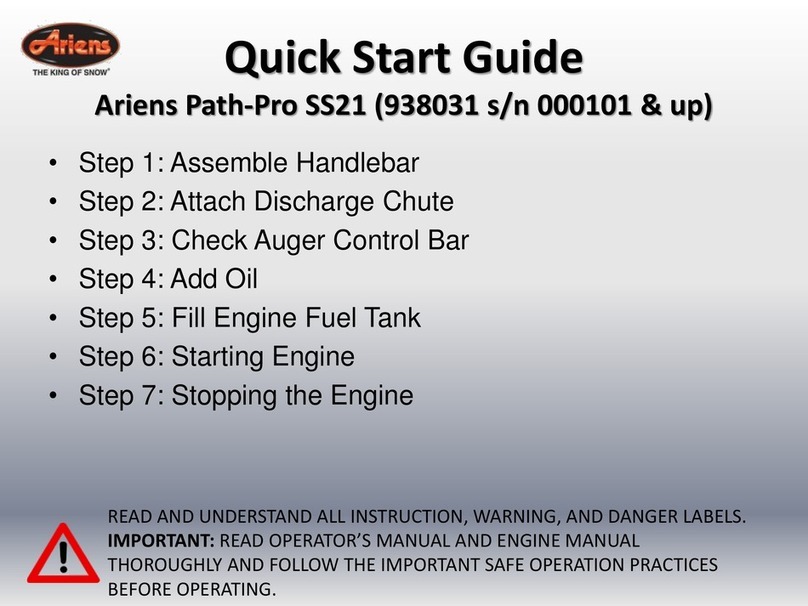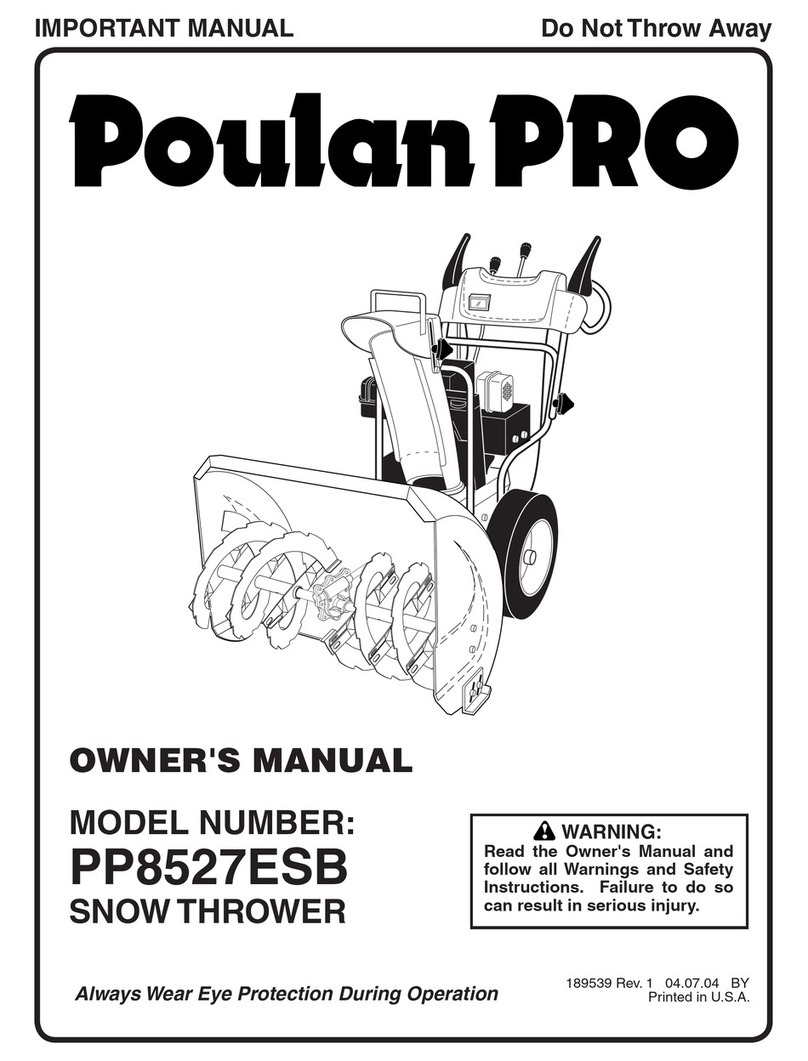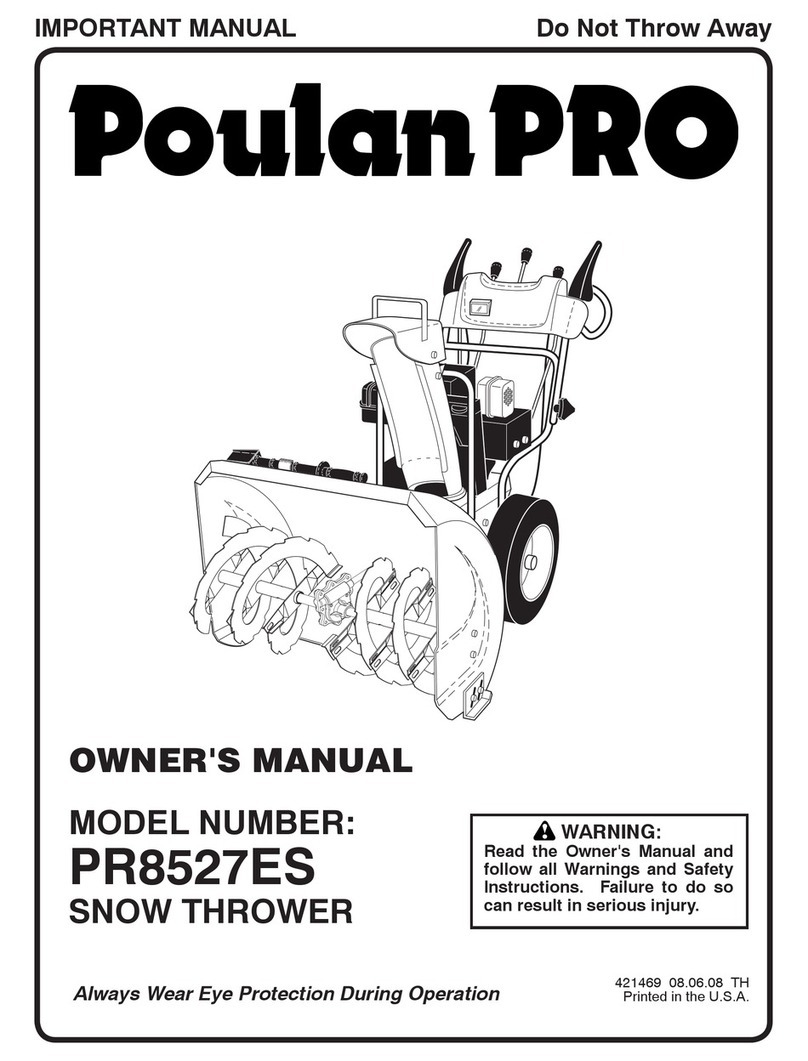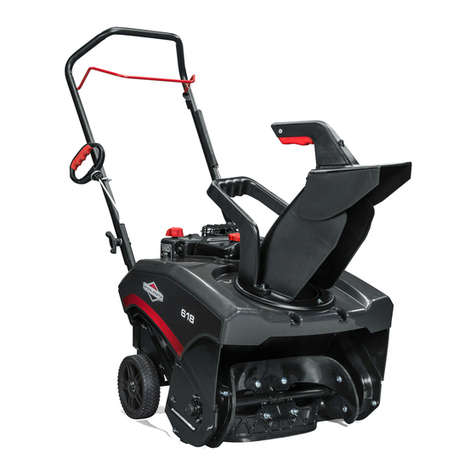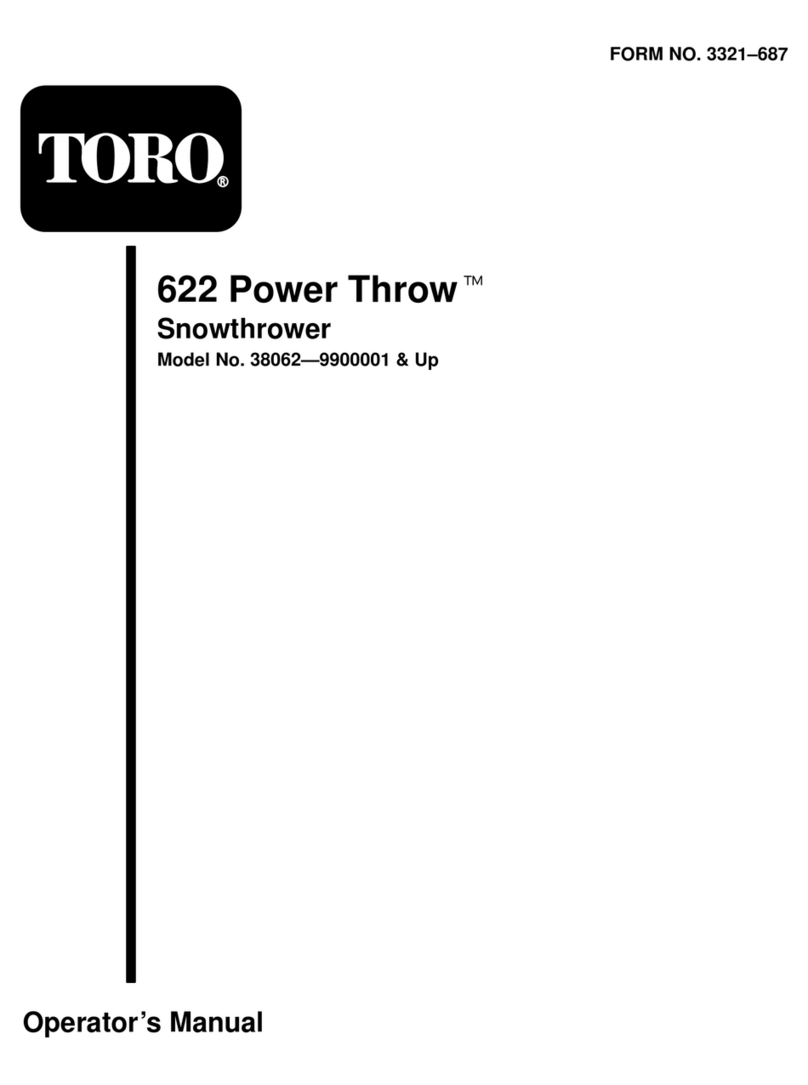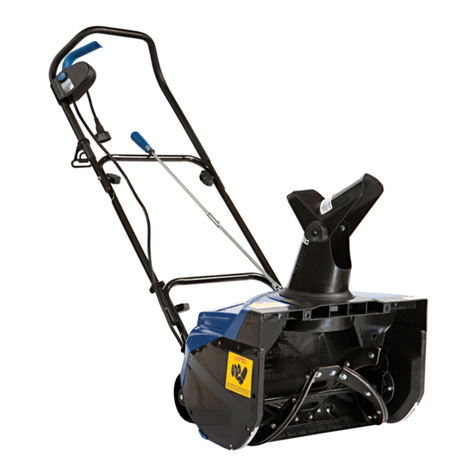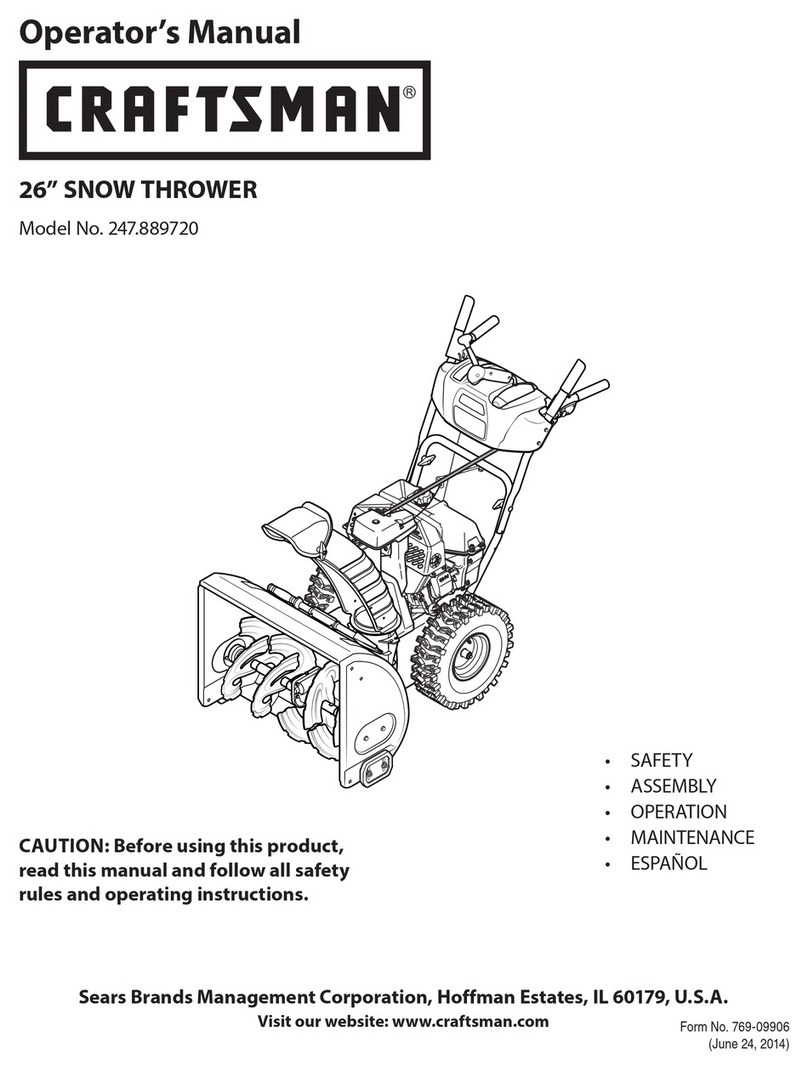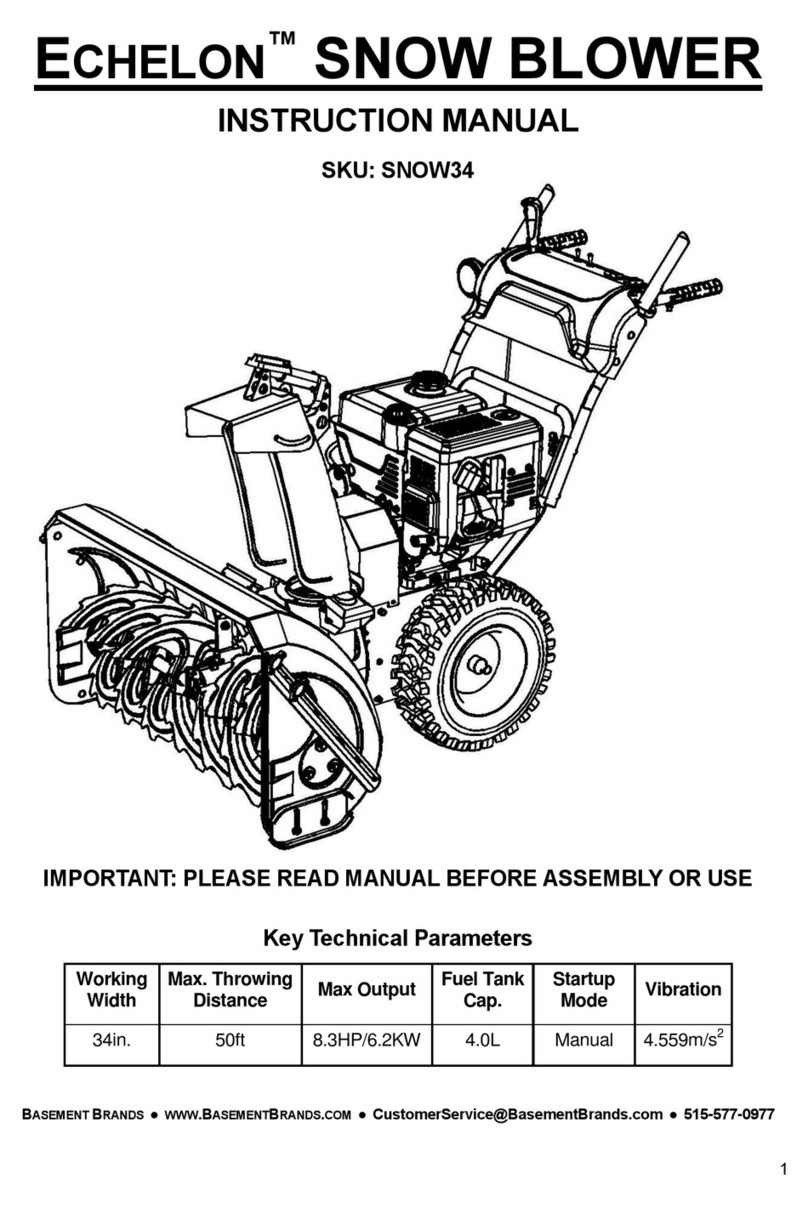Powr-Kraft PK30235L Operation instructions

12-16-13 Revision
1-Stage Snow Thrower
Operator’s Manual
MODEL NUMBER : PK30235L
SERIAL NUMBER :
Both model number and serial number may be found on the main
label. You should record both of them in a safe place for future use.
FOR YOUR SAFETY
READ AND UNDERSTAND THE ENTIRE MANUAL BEFORE
Save This Manual for Future Reference
Original Instruction

12-16-13 Revision
1-STAGE SNOW THROWER
2
GB TABLE OF CONTENTS
ENVIRONMENTAL
Specifications
INTRODUCTION
Introduction 2
Environmental 2
Symbols 3
Safety 3
General Safety Rules 3
Specific Safety Rules 6
Contents supplied 7
Assembly 8
Know your machine 9
Features & Controls 9
Adjustments 12
Operation 13
Starting and Stopping the Engine 13
Snow Throwing Tips 14
Unclogging Discharge Chute 14
Traveling 15
Transport 15
Maintenance 15
Engine 15
Lubrication 15
Off-Season Storage 15
Service 16
Auger Belt Replacement 16
Auger Paddles Replacement 16
Trouble Shooting 17
Parts Schedule 19
Your new snow thrower will more than satisfy
your expectations. It has been manufactured
under stringent quality standards to meet
superior performance criteria. You will find it
easy and safe to operate, and with proper care, it
will give you many years of dependable service.
Carefully read through this entire
operator’s manual before using your
new snow thrower. Take special care
to heed the cautions and warnings.
Recycle unwanted materials instead
of disposing off them as waste. All
tools, hoses and packaging should
be resorted, taken to the local
recycling center and disposed off in
an environment-friendly safe way.
Your snow thrower has many features that
will make your job faster and easier. Safety,
performance, and dependability have been
given to top priority in the development of this
machine, making it easy to maintain and operate.
The Engine manufacturer is responsible
for all engine-related issues with regards to
performance, power rating, specifications,
warranty and service. Please refer to the Engine
Manufacturer’s owner’s/operator’s manual,
packed separately with your unit, for more
information.
Item No. 30235
Clearing Width 57.5cm
Intake Height 33.2cm
Auger Dia. 24.0cm
Speed 1F
Snow Engine Model LC168FD 196cc
Engine is a made by Loncin and
warranty support is through
www.awsglobal.net. 1-866-393-3968

12-16-13 Revision
1-STAGE SNOW THROWER 3
GB
SYMBOLS
The rating plate on you r m a c h i ne may
show symbols. These represent important
information about the product or instructions
on its use.
SAFETY
General Safety Rules
Understand your machine
Allow operation only by properly trained adult,
never children.
Read and understand the operator’s manual
and labels affixed to the machine. Learn its
application and limitations as well as the
specific potential hazards peculiar to it.
Be thoroughly familiar with the controls and
their proper operation. Know how to stop the
machine and disengage the controls quickly.
Make sure to read and understand all the
instructions and safety precautions as outlined
in the Engine Manufacturer’s Manual, packed
separately with your unit. Do not attempt to
operate the machine until you fully understand
how to properly operate and maintain the
Engine and how to avoid accidental injuries
and/or property damage.
Work area
Never start or run the engine inside a closed
area. The exhaust fumes are dangerous,
containing carbon monoxide, an odorless and
deadly gas. Operate this unit only in a well
ventilated outdoor area.
Never operate the machine without good
visibility or light.
Never operate the machine on a steep slope.
Personal safety
Do not operate the machine while under the
influence of drugs, alcohol, or any medication
that could affect your ability to use it properly.
Dress properly. Wear heavy long pants, boots
and gloves. Do not wear loose clothing, short
pants, and jewelry of any kind. Secure long
hair so it is above shoulder level. Keep your
hair, clothing and gloves away from moving
parts. Loose clothes, jewelry or long hair can
be caught in moving parts.
Read these instructions for use
carefully.
Wear eye protection.
Wear hearing protection.
Wear safety footwear.
Keep bystanders away.
Stop engine and remove ignition
key prior to leaving the operator’s
position.
Only use clean-out tool to clear
blockage. Never use your hands.
It is forbidden to remove or tamper
with the protection devices and
safety devices.
Do not smoke or have open flames.
Do not touch a hot muffler, gear
housing or cylinder.
Stop engine, remove key, read
manual before making any repairs
or adjustments.
Keep hands out of the inlet and
discharge openings while machine
is running.
Stay away from rotating augers.
Never direct discharge towards
persons or property.

12-16-13 Revision
1-STAGE SNOW THROWER
4
GB Use safety equipment. Always wear eye
protection. Safety equipment such as a dust
mask, hard hat, or hearing protection used for
appropriate conditions will reduce personal
injuries.
Check your machine before starting it. Keep
guards in place and in working order. Make
sure all nuts, bolts, etc. are securely tightened.
Disengage all clutches and shift into neutral
before starting the engine.
Never operate the machine when it is in need
of repair or is in poor mechanical condition.
Replace damaged, missing or failed parts
before using it. Check for fuel leaks. Keep the
machine in safe working condition.
Never tamper with safety device. Check their
proper operation regularly.
Do not use the machine if the engine’s throttle
control does not turn it on or off. Any gasoline
powered machine that can not be controlled
with the engine throttle control is dangerous
and must be replaced.
Form a habit of checking to see that keys
and adjusting wrenches are removed from
machine area before starting it. A wrench or
a key that is left attached to a rotating part of
the machine may result in personal injury.
Stay alert, watch what you are doing and use
common sense when operating the machine.
Do not overreach. Do not operate the machine
while barefoot or when wearing sandals or
similar lightweight footwear. Wear protective
footwear that will protect your feet and
improve your footing on slippery surfaces.
Keep proper footing and balance at all times.
This enables better control of the machine in
unexpected situations.
Avoid accidental starting. Be sure the engine’s
throttle control is off before transporting the
machine or performing any maintenance or
service on the unit. Transporting or performing
maintenance or service on a machine with its
throttle control on invites accidents.
Fuel safety
Fuel is highly flammable, and its vapors can
explode if ignited. Take precautions when
using to reduce the chance of serious personal
injury.
When refilling or draining the fuel tank, use
an approved fuel storage container while in
a clean, well-ventilated outdoor area. Do not
smoke, or allow sparks, open flames or other
sources of ignition near the area while adding
fuel or operating the unit. Never fill fuel tank
indoors.
Keep grounded conductive objects, such as
tools, away from exposed, live electrical parts
and connections to avoid sparking or arcing.
These events could ignite fumes or vapors.
Always stop the engine and allow it to cool
before filling the fuel tank. Never remove
the cap of the fuel tank or add fuel while the
engine is running or when the engine is hot.
Do not operate the machine with known leaks
in the fuel system.
When practical, remove the machine from the
truck or trailer and refuel it on the ground. If
this is not possible, then refuel the machine on
a trailer with a portable container, rather than
from a fuel dispenser nozzle.
Loose the fuel tank cap slowly to relieve any
pressure in the tank.
Keep the nozzle in contact with the firm of the
fuel tank or container opening at all times until
fueling is complete. Do not use a nozzle lock-
open device.
Never over fill fuel tank. Fill tank to no more
than 12.5mm (1/2”) below the bottom of the
filler neck to provide space for expansion as
the heat of the engine and/or sun cause fuel
to expand.
Replace all fuel tank and container caps
securely and wipe up spilled fuel. Never
operate the unit without the fuel cap securely
in place.

12-16-13 Revision
1-STAGE SNOW THROWER 5
GB
Avoid creating a source of ignition for spilled
fuel. If fuel is spilled, do not attempt to start
the engine but move the machine away
from the area of spillage and avoid creating
any source of ignition until fuel vapors have
dissipated. Serious personal injury can occur
when fuel is pilled on yourself or your clothes
which can ignite. Wash your skin and change
clothes immediately.
Store fuel in containers specifically designed
and approved for this purpose.
Never fill containers inside a vehicle or on a
truck or trailer bed with a plastic liner. Always
place containers on the ground away from
your vehicle before filling.
Store fuel in a cool, well-ventilated area.
Safely away from sparks, open flames or other
sources of ignition.
Never store fuel or machine with fuel in the
tank inside a building where fumes may
reach a spark, open flame, or other sources
of ignition, such as a water heater, furnace,
clothes dryer and the like. Allow the engine to
cool before storing in any enclosure.
Machine use and care
Never pick up or carry a machine while the
engine is running.
Do not force the machine. Use the correct
machine for your application. The correct
machine will do the job better and safer at the
rate for which it was designed.
Do not change the engine governor settings
or over-speed the engine. The governor
controls the maximum safe operating speed
of the engine.
Do not put hands or feet near rotating parts.
Avoid contact with hot fuel, oil, exhaust fumes
and hot surfaces. Do not touch the engine or
muffler. These parts get extremely hot from
operation. They remain hot for a short time
after you turn off the unit. Allow the engine
to cool before doing maintenance or making
adjustments.
After striking a foreign object, stop the
engine, remove the wire from the spark
plug, thoroughly inspect the machine for
any damage, and repair the damage before
restarting and operating the machine.
If the machine should start to make an unusual
noise or vibration, immediately shut off the
engine, disconnect the spark plug wire, and
check for the cause. Unusual noise or vibration
is generally warning of trouble.
Us e o nly a t t ach m ents a n d ac c ess o ries
approved by the manufacturer. Failure to do
so can result in personal injury.
Maintain the machine. Check for misalignment
or binding of moving parts, breakage of parts
and any other condition that may affect the
machine’s operation. If damaged, have the
machine repaired before use. Many accidents
are caused by poorly maintained equipment.
Keep the engine and muffler free of grass,
leaves, excessive grease or carbon build up to
reduce the chance of a fire hazard.
Never douse or squirt the unit with water or
any other liquid. Keep handles dry, clean and
free from debris. Clean after each use.
Observe proper disposal laws and regulations
for gas, oil, etc. to protect the environment.
Store idle machine out of the reach of children
and do not allow persons unfamiliar with
the machine or these instructions to operate
it. Machine is dangerous in the hands of
untrained users.
Service
B e fo r e c l ea n i n g , r ep a i r , in s p e c t i ng , o r
adjusting shut off the engine and make certain
all moving parts have stopped. Always make
sure the engine’s throttle control is in its STOP
position. Disconnect the spark plug wire, and
keep the wire away from the plug to prevent
accidental starting.
Have your machine serviced by qualified repair
personnel using only identical replacement
parts. This will ensure that the safety of the
machine maintained.

12-16-13 Revision
1-STAGE SNOW THROWER
6
GB Specific Safety Rules
Do not operate without wearing adequate
winter outer garments.
Do not use the machine on a roof.
Always check overhead and side clearances
carefully before operation. Always be aware of
traffic when operating along streets or curbs.
Thoroughly inspect the area to be worked.
Keep the working area clean and free of toys,
doormats, newspapers, sleds, boards, wires and
other foreign objects, which could be tripped
over or thrown by the auger/impeller. Check
for weak spots on docks, ramps or floors.
Plan your snow-throwing pattern to avoid
discharge toward people or areas where
property damage can occur.
Do not operate near drop-offs, ditches, or
embankments. Machine can suddenly turn
over if a wheel is over the edge of a cliff or
ditch, or if an edge caves in.
Keep all bystanders, children, and pets at least
23m (75 feet) away. If you are approached,
stop the unit immediately.
Use a grounded three-wire extension cord and
receptacle for all machines with electric start
engines.
Check clutch and brake operation frequently.
Adjust and service as required. The auger must
stop quickly when control lever is released.
Let engine and machine adjust to outdoor
temperature before starting to clear snow.
Stay alert for hidden hazards or traffic.
Do not overload machine capacity by attempting
to clear snow at too fast of a rate.
Do not throw snow any higher than necessary.
Adjust auger housing height to clear gravel
or crushed rock surfaces. Exercise extreme
caution when operating.
Exercise caution to avoid slipping or falling,
especially when operating in reverse. Never
operate machine at high transport speeds
on slippery surfaces. Always look down and
behind before and while backing.
Do not operate on steep slopes. Do not clear
snow across the face of slopes. Keep all
movement on slopes slow and gradual. Do not
make sudden changes in speed or direction.
Use a slow speed to avoid stops or shifts on
slopes. Avoid starting or stopping on a slope.
Disengage power to the auger when transporting
or not in use.
Disengage all control levers and stop engine
before you leave the operating position
(behind the handles). Wait until the auger
comes to a complete stop before unclogging
the chute assembly, making any adjustments,
or inspections.
Hand contact with the rotating parts inside
the discharge chute is the most common
cause of injury associated with snow throwers.
Do not unclog chute assembly while engine
is running. Shut off engine and remain behind
handles until all moving parts have stopped
before unclogging. Never put your hand in
the discharge or collector openings. Always
use the clean-out tool provided to unclog the
discharge opening.

12-16-13 Revision
1-STAGE SNOW THROWER 7
GB
The snow thrower comes partially assembled and is shipped in carefully packed carton. After all
the parts have been removed from the carton, you should have:
1. Snow Thrower Unit
2. Discharge Chute
3. Chute Crank Lever
4. Handle
5. Operator’s Manual & Engine Manual
6. Engine Hardware Bag
CONTENTS SUPPLIED
7. Snow Thrower Hardware Bag, Including
63
1
2
74
5
M10 X 45 X 4 A
M5 X 25 X 1 B
ST6.3 X 25 X 3 C

12-16-13 Revision
1-STAGE SNOW THROWER
8
GB
Following the assembly directions below,
you will assemble the snow thrower in a few
minutes
Handle
Install the handle to the lower handle using
four M10X45 screws, washers and nuts. Be
sure not to pinch or kink the auger clutch
cable in the process.
Slowly pull the recoil starter handle up
towards the eye bolt.
Place the chute crank lever onto the chute
rotation rod and secure with the screw and
nut.
Align the holes in the chute base with the
holes in the lower chute and secure with
three screws.
Slip the recoil starter rope into the eye bolt
from the back of the snow thrower.
2.
3.
1
1
2.
ASSEMBLY
Discharge Chute
M10 X 45 X 4 A
M5 X 25 X 1 B
ST6.3 X 25 X 3 C
Do not overtighten the screws;
otherwise you may damage the
discharge chute and prevent it from
turning freely.

12-16-13 Revision
1-STAGE SNOW THROWER 9
GB
KNOW YOUR MACHINE
Features and Controls
Chute Deflector
Fuel Filler Cap
Auger Clutch
Cable Adjuster Link
Recoil Start Handle
Discharge Chute
Auger
Scraper Blade
Belt Cover
Chute Crank Lever
Engine Oil Fill Cap w/Dipstick
Safety Ignition Switch
Electric Start Botton
Primer
Choke
Power Cord Plug
Oil Drain Plug

12-16-13 Revision
1-STAGE SNOW THROWER
10
GB
Rotate the discharge crank lever clockwise
to move the discharge chute to the right;
counterclockwise to move the chute to the
left.
Loosen the deflector wing knob and adjust
the chute deflector up or down to control the
snow discharge height and distance. Tighten
the wing knob securely to hold the desired
deflector adjustment once the desired position
have been achieved.
Chute Crank Lever
Chute Deflector
Auger Clutch
To engage the auger and start throwing snow,
hold the auger clutch against the handle.
To disengage the auger, release the auger
clutch.
Auger & Scraper Blade
When engaged, the auger rotates and draws
snow into the auger housing and throws it out
the discharge chute. Rubber paddles on the
auger also aid in propelling the snow thrower
as they come in contact with the pavement.

12-16-13 Revision
1-STAGE SNOW THROWER 11
GB
The scraper blade maintains contact with the
pavement as the snow thrower is propelled,
allowing snow close to the pavement’s surface
to be discharged.
The auger and the scraper blade are subject
to wear and damage. They should be checked
periodically. Adjust or replace when necessary.
During initial break-in period of
the auger, i t is normal for the
auger to build up excessive heat if
not operated in the snow. Do not
operate without snow or water for
lubricating the auger. This will cause
excessive heat build up in the auger
which could cause damage to the
auger and scraper blade.
Do not use the primer if the engine
h a s b e e n r u n n i n g a n d i s h o t .
Excessive priming may flood the
engine and prevent it from starting.
Use an extension cord recommended
for outdoor use that is not longer
than 15m (50 feet)
Thoroughly inspect the electrical
cord before using the machine. If
the cord is damaged, do not operate
the machine. Replace or repair the
damaged cord immediately.
Connect exten sion cord to the
electric starter plug-in first and
then to a power outlet; disconnect
the extension cord from the power
ou t le t fi r s t an d t hen f r om th e
machine.
To prevent damaging the electric
starter, do not run it more than
5 continuous seconds each time
you try to start. Wait 10 seconds
between each attempt.
Unplug the power cord whenever
yo u a re no t st ar t i ng t h e sn o w
thrower.
D u r i n g i n i t i a l o p e r a t i o n t h e r e
may be wear between the auger
and the scraper blade. Maximum
performance, both snow throwing
and driving, occurs when there is
zero clearance between these two
parts.
Firmly push in the primer with your
thumb, holding the primer in for a
second before releasing it each time.
Remove your glove when you push
in the primer so that air can not
escape from the primer hole.
Choke
Engage choke by rotating lever to FULL
position whenever you are starting a cold
engine. As engine warms up, gradually rotate
the choke to the OFF position.
Recoil Starter
The recoil starter is on the back side of the
engine. Pull the recoil starter handle to start
the engine.
Safety Ignition Switch
Insert the safety ignition key for engine to
start and run. To stop the engine, remove the
key.
Electric Starter & Start Button (if so equipped)
The electric starter will start a properly choked
and cranked engine when start button is
pushed.
To start the machine, connect the electric
starter to an electric power source with an
approved extension cord and press the start
button.
Do not use choke to start a warm
engine.
Never use choke to stop engine.
Primer
Press the primer to pump additional fuel from
the carburetor to the cylinder for improved
cold weather starting.

12-16-13 Revision
1-STAGE SNOW THROWER
12
GB
Scraper Blade
When place the snow thrower on a level
surface, the wheels, scraper blade and auger
should all contact the lever surface. If the
scraper blade is adjusted too high, snow may
blow under the housing. If the scraper blade
wears out excessively, or the snow thrower
does not self-propel, the scraper blade may be
too low and needs to be adjusted.
Auger Clutch
The auger must not turn unless the auger
clutch is engaged. The auger must stop within
5 seconds after the auger clutch is released.
If the auger no longer turns when the auger
clutch is engaged or if the belt slips under
load, the auger cable or belt may have
stretched. This can be compensated for by
adjusting the auger clutch cable.
The upper hole in auger clutch lever provides
for an quick adjustment method. To adjust,
unhook and move the clutch cable to the
upper position. Insert the cable from the
outside.
The cable adjuster link on the auger clutch
ca b l e provi d e s the m et h o d for v erni e r
adjustment:
To adjust the scraper blade proceed as
follows:
Adjustments
Run the snow thrower until the fuel tank is
empty.
Pull the recoil starter handle until resistance
is felt. Then tip the snow thrower back until
it rest on the handle.
Loosen the four flange lock nuts and
carriage screws which secure the scraper
blade to housing. Move the scraper blade
to the desired position and retighten the
nuts and screws securely.
T i p t h e s n o w t h r o w e r b a c k t o t h e
operating position and pull the starter
handle a few times to see if it is difficult to
pull.
If the starter is difficult to pull, remove
the spark plug and pull the handle several
times to ensure that any oil trapped in the
head is removed.
Inspect the spark plug. If it is wet, clean off
any oil before re-installing.
1
2.
3.
5.
6.
4.
On new snow throwers with a new
scraper blade installed, the auger
may be slightly off the ground.
Oil may come out of the spark plug
hole when it is removed and the
starter handle is pulled.
The clutch cable must contain some
slack when you disengage the clutch
lever for the auger to stop properly.

12-16-13 Revision
1-STAGE SNOW THROWER 13
GB
Test the snow thrower to see if there is a
noticeable difference. If after the adjustment
to the control cable the auger still hesitates
when rotating, replace the auger belt.
Slide up the spring cover and unhook the
spring from the adjuster link.
Move the Z-bend to a higher or lower hole
on the adjuster link as needed to obtain
proper auger clutch adjustment.
Hook the spring to the adjuster link and
slide the spring cover over the adjuster
link.
1
2.
3.
You can pull up the adjuster link and
cable to make unhooking the spring
easier.
Z-bend
Spring Hook
Spring Cover
Adjuster link
OPERATION
Starting and Stopping the Engine
The engine is equipped with both electric
starter and a recoil starter. The electric starter
is equipped with a three-wire power cord and
plug and is designed to operate at the voltage
shown in the label.
Cold Start – Electric Starter (if so equipped)
Before starting the engine, check
engine oil level and ensure the
engine is served as described in
the Engine Manual with the snow
thrower.
Do not use the electric starter if
your household voltage different
from the one shown on the electric
starter.
Insert safety ignition key into ignition slot
until it clicks. Do not turn the key.
Move choke control to FULL position.
Push the primer 2 or 3 times. When temperature
is below -25oC (15oF), additional priming may
be needed. When temperature is above 10oC
(50oF), priming is not necessary.
Connect the extension cord to the engine.
Plug the other end of the extension cord
into a three-wire grounded receptacle.
Push starter button until engine starts.
1
4.
5.
6.
2.
3.
Over priming may cause flooding,
preventing the engine from starting.
If you do flood the engine, wait a
few minutes before attempting to
start and do not push the primer.
To prevent damaging the electric
starter, do not run it more than
5 continuous seconds each time
you try to start. Wait 10 seconds
between each attempt.

12-16-13 Revision
1-STAGE SNOW THROWER
14
GB 7. When the engine starts, release the starter
button and slowly move the choke control
to the OFF position.
8. Disconnect the extension cord from the
receptacle first, then from the engine.
Insert safety ignition key into ignition slot
until it clicks. Do not turn the key.
2. Rotate choke control to FULL position.
3. Pu s h t h e prime r 2 or 3 times. Wh en
t e m pe r a t u r e i s b e l o w - 2 5 oC ( 1 5 oF ) ,
additional priming may be needed. When
temperature is above 10oC (50oF), priming
is not necessary.
Grasp recoil starter handle and pull rope
out slowly until it pulls harder. Let rope
rewind slowly.
Pull rope with a rapid continuous full arm
stroke. Do not allow starter rope to snap
back.
Repeat steps 4 and 5 until engine starts.
When the engine starts, release the recoil
starter handle and slowly move the choke
control to the OFF position.
Follow the steps above, keeping the choke
control in the OFF position and do not use
primer.
1
5.
6.
7.
4.
Cold Start – Recoil Starter
It is easier and more efficient to remove snow
immediately after it falls.
The best time to remove snow is the early
morning. At this time the snow is usually dry
and has not been exposed to the direct sun
and warming temperatures.
Slightly overlap each successive path to
ensure all snow will be removed.
For large areas, start in the middle and throw
snow to each side, so snow is not cleared
more than once.
For extremely heavy snow, reduce the width
of snow removal by overlapping previous path
and moving slowly.
Throw snow downwind whenever possible.
On gravel or crushed rock surfaces, push
down slightly on the handle to avoid ingesting
rocks. Do not allow rocks and gravel to be
picked up and thrown from snow thrower.
Keep engine clean and clear of snow during
use. This will help air flow and extend engine
life.
After snow-throwing is completed, let the
engine run for a few minutes to help dry
off the moisture on the engine and prevent
moving parts from freezing. Engage the auger
to clear any remaining snow from inside
the housing. Rotate the discharge chute to
prevent it from freezing. Stop the engine, wait
for all moving parts to stop, and remove all
ice and snow from the snow thrower. With
the engine off, pull the recoil starter handle
several times to prevent the recoil starter from
freezing up.
Warm Start
Over priming may cause flooding,
preventing the engine from starting.
If you do flood the engine, wait a
few minutes before attempting to
start and do not push the primer.
Allow the engine to warm up for a
few minutes, engine will not develop
full power until it has reached normal
operating temperature.
I n s n o w y a n d c o l d c o n d i t i o n s ,
some controls and moving parts
may freeze. Do not use excessive
force when trying to operate frozen
con t r o l s . I f y ou have diffic ul t y
operating any control or part, start
the engine and let is run for a few
minutes.
Unclogging Discharge Chute
Never use your hands to clear a
clogged discharge chute. Shut off
engine and remain behind handle
until all moving parts have stopped
before unclogging.

12-16-13 Revision
1-STAGE SNOW THROWER 15
GB
Tip the handle forward slightly to allow the
rubber paddles on the auger to contact the
pavement and propel the snow thrower
forward. Pushing downward on the handle
will raise the auger off the ground and stop
forward motion.
Traveling
Excessive upward pressure on the
handle will result in premature wear
on the rubber auger paddles.
Always shut off engine, remove
key, and close fuel shut-off valve
when transporting unit on a truck
or trailer. Do not transport machine
while engine is running.
Use extra care when loading or unloading unit
onto trailer or truck.
Secure unit chassis to transport vehicle. Never
secure from rods or linkages that could be
damaged.
Transport
MAINTENANCE
Engine
Lubrication
Refer to the Engine Operator’s Manual.
Lubricate the pivot points on the auger clutch
lever and the spring at the end of the clutch
cable with a light oil once every season before
off-season storage.
At the end of the season or if the snow
thrower will not be used for 30 days or longer,
follow the storage instructions below.
Refer to the Engine Manual for
information on storing your engine.
Off-Season Storage
Run the engine until the fuel lines and
carburetor are empty and it stops due to
lack of fuel.
Remove the safety ignition key and allow
the engine to cool.
Lubricate the machine as instructed.
Clean the exterior of the engine and the
snow thrower thoroughly.
Touch up all rusted or chipped paint
surfaces; sand affected areas before
painting, and use a rust preventative to
prevent the metal parts from rusting.
Tighte n a l l loose s c r e w s, bol ts , and
locknuts. Repair or replace any damaged
parts.
Cover the machine and store it in a clean,
dry place out of the reach of children.
1.
2.
3.
4.
5.
6.
7.

12-16-13 Revision
1-STAGE SNOW THROWER
16
GB
Remove the screws that hold the belt
cover in place and set the cover aside.
Remove the existing rubber paddles by
unthreading the hex washer screws which
secure them to the auger.
Secure the replacement rubber paddles
to the auger using the hardware removed
earlier.
Route the end of the new belt around the
auger pulley and slide the pulley back on
to the auger shaft. It may be necessary to
push down on the idler pulley to get the
auger pulley under the belt keeper.
Replace the screw and washer and tighten
securely.
Reinstall the belt cover removed earlier.
Route the new belt around the drive pulley
and under the idler pulley.
Remove the auger pulley and the belt.
1
1
3.
4.
5.
6.
2.
2.
SERVICE
Auger Belt Replacement
If the auger belt becomes worn, oil-soaked,
or otherwise damaged, proceed as follows to
replace the belt.
The snow thrower auger’s rubber paddles are
subject to wear and should be replaced if any
signs of excessive wear are present.
Auger Paddles Replacement
Do not allow the auger’s rubber
paddles to wear to the point where
portions of the metal auger itself
c a n c o m e i n c o n t a c t w i t h t h e
pavem ent. Doing so can result
in serious damage to the snow
thrower.
T h e a u g e r p a d d l e s s h o u l d b e
replaced one at a time so that the
auger still attached can be used as
an example for positioning and re-
installing the new auger.

12-16-13 Revision
1-STAGE SNOW THROWER 17
GB
TROUBLE SHOOTING
Problem Cause Remedy
Electric starter does
not turn(on models so
equipped)
1.Extension cord not connected.
2.The extension cord is worn,
corroded, or damaged.
3.The power outlet is not energized.
1.Connect the extension cord to the
outlet and/or the machine.
2.Replace the extension cord.
3.Have a qualified electrician
energize the outlet.
Engine fails to start
1.Choke not in CHOKE position.
2.Engine not primed.
3.Engine is flooded.
4.Spark plug wire loose or
disconnected.
5.Fuel tank empty or stale fuel.
6.Faulty spark plug.
7.Safety ignition key is not inserted.
8.The engine oil level in the engine
crankcase is too low or too high.
1. Move choke to CHOKE position.
2.Prime engine as instructed in this
manual.
3.Wait a few minutes before
restarting, do not prime.
4.Connect or tighten spark plug wire.
5.Fill tank with clean, fresh gasoline.
6.Clean, adjust gap, or replace.
7.Insert safety ignition key.
8.Add or drain oil to adjust the oil
level in the engine crankcase.
Engine idles or runs
roughly
1.Engine running on CHOKE.
2.Fuel tank is nearly empty or stale
fuel.
3.Contaminated fuel supply.
4.Carburetor out of adjustment.
5.Engine over-governed.
6.Spark plug wire loose.
7.Faulty spark plug.
8.The engine oil level in the engine
crankcase is too low or too high.
1. Move choke lever to RUN position.
2.Fill tank with clean, fresh gasoline.
3.Replace with clean fuel.
4.Contact a qualified repair
personnel.
5.Contact a qualified repair
personnel.
6.Tighten spark plug wire.
7.Clean, adjust gap, or replace.
8.Add or drain oil to adjust the oil
level in the engine crankcase.
Loss of power
1.Spark plug wire loose.
2.Gas gap vent hole plugged.
3.Dirty or clogged muffler.
1. Tighten spark plug wire.
2.Clean or replace fuel cap.
3.Clean or replace muffler
The engine overheats Carburetor not adjusted properly. Contact a qualified repair personnel.
Excessive vibration Loose parts or damaged parts. Tighten all fasteners or replace
damaged parts.
Snow thrower fails to
self-propel
1.Auger clutch cable out of
adjustment.
2.Auger belt loose or damaged.
1. Adjust auger clutch cable.
2. Replace auger belt.
Auger fails to stop
within 5 seconds
after auger clutch is
released.
Auger clutch cable out of
adjustment. Adjust auger clutch cable.

12-16-13 Revision
1-STAGE SNOW THROWER
18
GB Problem Cause Remedy
Snow thrower fails to
discharge snow
1.Discharge chute clogged.
2.Auger jammed.
3.Auger clutch cable not adjusted
properly.
4.Auger belt loose or damaged.
5.Auger rubber paddles worn or
damaged.
6.Throwing too much snow.
7.Trying to remove extremely heavy
or wet snow.
8.Auger is frozen in place.
1. Unclog discharge chute.
2.Remove debris or foreign object
from auger.
3.Adjust auger clutch cable.
4.Replace auger belt.
5.Replace rubber paddles.
6.Reduce width of swath.
7.Do not overload with extremely
heavy or wet snow.
8.Move unit to a warm place to
thaw.

12-16-13 Revision
1-STAGE SNOW THROWER 19
GB
PARTS SCHEDULE

12-16-13 Revision
Parts Request Form
Faxto541‐895‐2756orE‐mail
Name:
Address:
City State Zip:
Phone:
E‐mail:
Model Number:
Serial Number:
Purchased From:
Purchase Date:
Item No. Description Qty Price Amount
Comments:
Table of contents
Other Powr-Kraft Snow Blower manuals
